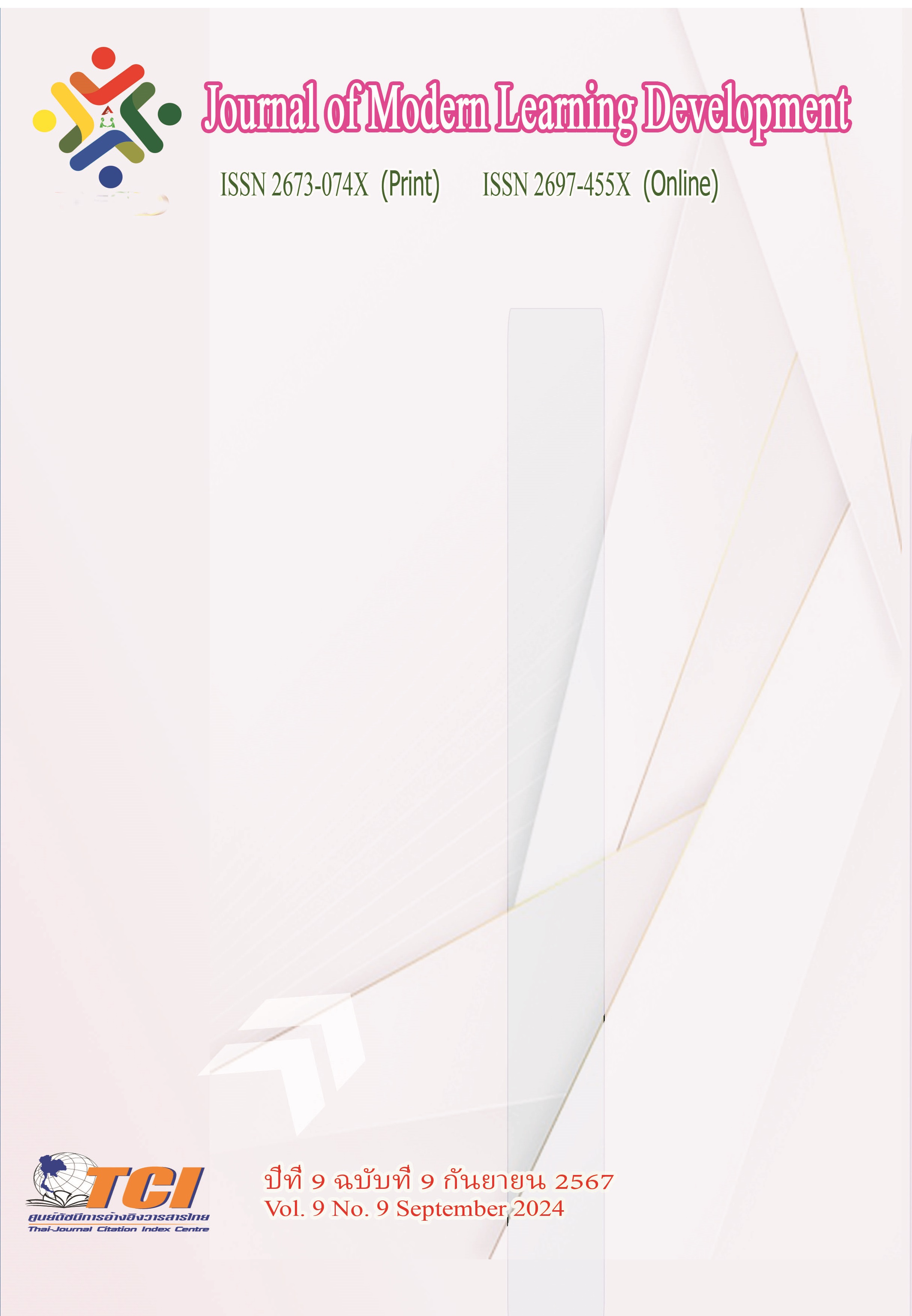The Impact of Technological Pedagogical Knowledge, Technostress on Work Performance in Chinese University: The Moderating Role of Extraversion
Main Article Content
Abstract
How do different educational contexts (rural vs. urban universities, public vs. private institutions) affect the relationship between TPK, technostress, and work performance? Understanding this can help tailor interventions based on specific institutional needs. The objectives of this research were 1) To study the Impact of Technological Pedagogical Knowledge, Technostress on Work Performance in Chinese University: The Moderating Role of Extraversion.
This research were collected through self-report surveys utilizing a seven-point Likert scale, ranging from 1 (strongly disagree) to 7 (strongly agree). This approach facilitated the measurement of variables related to technostress and academic performance. To enhance relevance to the target demographic, the Chinese Version of the Organization Big Five Scale (ORG-B5) was utilized to assess personality traits, particularly focusing on extraversion, which is central to the study.
The research results were found as follows; The Technological Pedagogical Knowledge (TPK) dimension in Technological pedagogical content knowledge (TPACK) is one of the important types of knowledge that teachers should have in the process of integrating technology. In the context of digital transformation of education, because technology integration reshapes the educational process, teachers' work performance is naturally affected by educational technology. Technology integration into teaching inevitably brings about technostress among teachers. Therefore, this study aimed to investigate the relationship between TPK, technostress and work performance of teachers in Chinese undergraduate colleges and universities. The results show that 1) TPK has an effect on technostress and work performance 2) technostress has an effect on work performance 3) extraversion moderates the relationship between TPK and technostress. The results of the study provide reference suggestions for enhancing work performance, relieving technostress, and having management of teachers in higher education in the context of digitalization.
Article Details
References
Al-Ali, M., & Marks, A. (2022). A digital maturity model for the education enterprise. Perspectives: Policy and Practice in Higher Education. 26 (2), 47-58.
Al-Fudail, M., & Mellar, H. (2008). Investigating teacher stress when using technology. Computers & Education. 51 (3), 1103-1110.
Brod, C. (1984). Technostress: The human cost of the computer revolution. Addison-Wesley.
Cai, Y., & Lin, C. (2003). Confirmatory Factor Analysis of Students' Evaluations on Teacher Performance Acta Psychologica Sinica, 03.
Cheng, T., & Zhu, S. (2023). The Relation Between Normal Education and Teachers' Job Performance: Impact Mechanism and Heterogeneity of Teaching Age. Education &Economy. 39 (5).
Feng, D., Ji, L., & Yin, Z. (2014). Personality, Perceived Occupational Stressor, and Health-Related Quality of Life Among Chinese Judges. Applied Research in Quality of Life. 9 (4), 911-921.
Fernández-Batanero, J.-M., Román-Graván, P., Reyes-Rebollo, M.-M., & Montenegro-Rueda, M. (2021). Impact of educational technology on teacher stress and anxiety: A literature review. International Journal of Environmental Research Public Health. 18 (2), 548.
Garrison, D. R., & Akyol, Z. (2009). Role of instructional technology in the transformation of higher education. Journal of Computing in Higher Education. 21 (1), 19-30.
Gurung, R. A., & Schwartz, B. M. (2011). Optimizing teaching and learning: Practicing pedagogical research. John Wiley & Sons.
Hatlevik, I. K., & Hatlevik, O. E. (2018). Examining the relationship between teachers’ ICT self-efficacy for educational purposes, collegial collaboration, lack of facilitation and the use of ICT in teaching practice. Frontiers in Psychology. 9, 935.
Hobfoll, S. E. (1989). Conservation of resources: A new attempt at conceptualizing stress. American Psychologist. 44 (3), 513.
Hung, W.-H., Chen, K., & Lin, C.-P. (2015). Does the proactive personality mitigate the adverse effect of technostress on productivity in the mobile environment? Telematics and Informatics. 32 (1), 143-157.
Jena, R. K. (2015). Technostress in ICT enabled collaborative learning environment: An empirical study among Indian academician. Computers in Human Behavior. 51, 1116-1123.
Jiang, H., Sun, J., & Jiang, J. (2017). The Moderator Effect of Organizational Identification on the Relationship between Personality and Performance. Teacher Education Research. 29 (1).
UNESCO Joo, Y. J., Lim, K. Y., & Kim, N. H. (2016). The effects of secondary teachers’ technostress on the intention to use technology in South Korea. Computers & Education. 95, 114-122.
Kirkwood, A., & Price, L. (2014). Technology-enhanced learning and teaching in higher education: what is ‘enhanced’ and how do we know? A critical literature review. Learning, Media and Technology. 39 (1), 6-36.
Lazarus, R. S., & Folkman, S. (1984). Stress, appraisal, and coping. Springer publishing company.
Li, L., & Wang, X. (2021). Technostress inhibitors and creators and their impacts on university teachers’ work performance in higher education. Cognition, Technology & Work. 23 (2), 315-330.
McCrae, R. R., & Costa, P. T. (1985). Comparison of EPI and Psychoticism Scales With Measures of the Five-Factor Model of Personality. Personality and Individual Differences.
Mishra, P., & Koehler, M. (2006). Technological pedagogical content knowledge: A framework for teacher knowledge. Teachers college record. 108 (6), 1017-1054.
Munyengabe, S., Yiyi, Z., Haiyan, H., & Hitimana, S. (2017). Primary teachers’ perceptions on ICT integration for enhancing teaching and learning through the implementation of one laptop per child program in primary schools of Rwanda. Eurasia Journal of Mathematics, Science Technology Education. 13 (11), 7193-7204.
Skaalvik, E. M., & Skaalvik, S. (2017). Still motivated to teach? A study of school context variables, stress and job satisfaction among teachers in senior high school. Social Psychology of Education. 20 (1), 15-37.
Tosuntaş, Ş. B., Çubukçu, Z., & Beauchamp, G. K. (2021). Teacher Performance in Terms of Technopedagogical Content Knowledge Competencies. Kastamonu Eğitim Dergisi.
UNESCO-ICHEI, & Institute of Education Tsinghua University. (2022). Research Report on Digital Transformation of Higher Education Teaching and Learning.
Wæraas, A., & Solbakk, M. N. (2009). Defining the essence of a university: lessons from higher education branding. Higher Education. 57 (4), 449-462.


